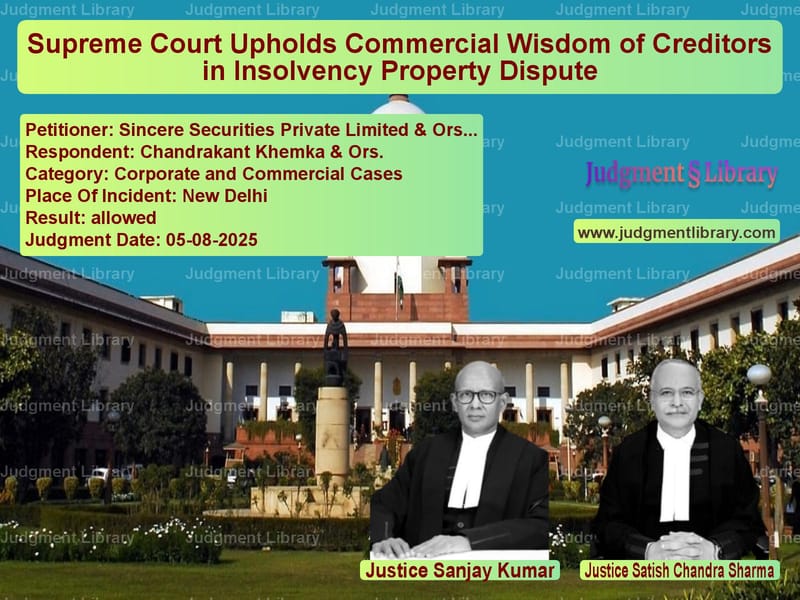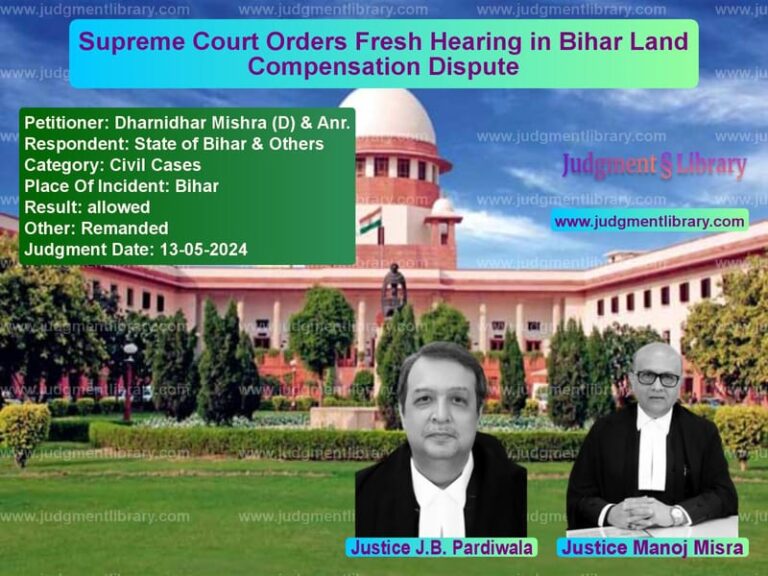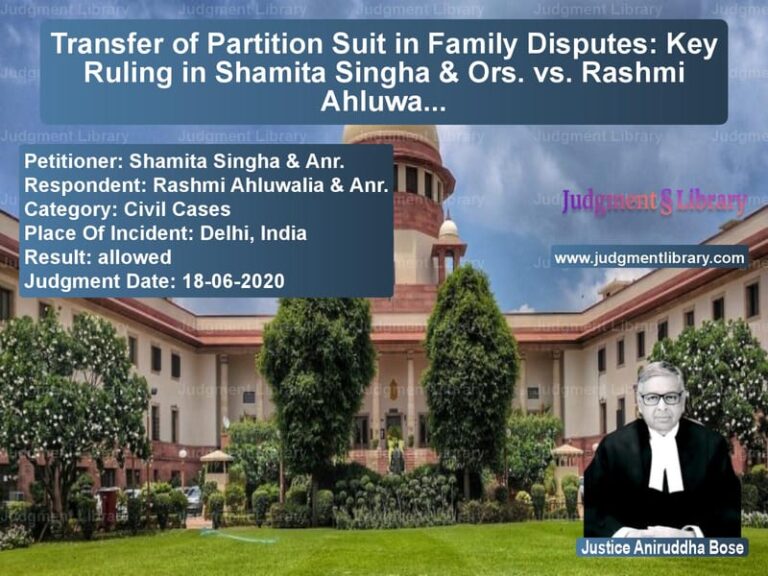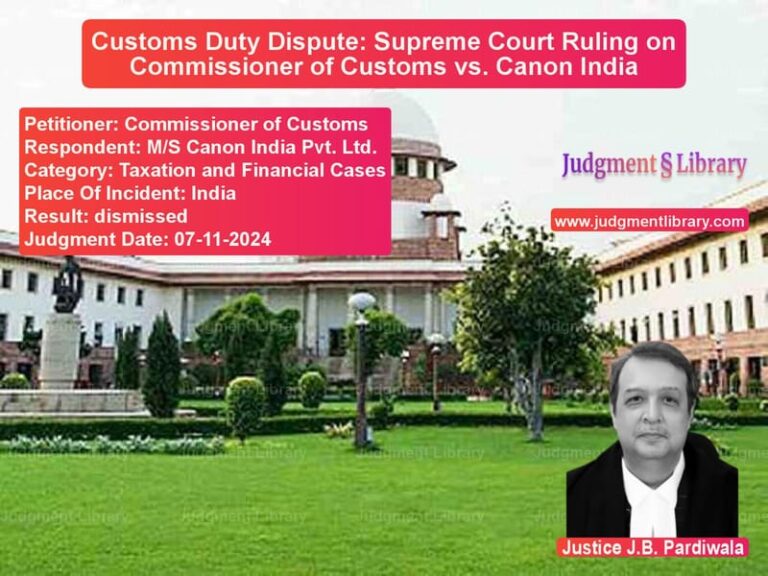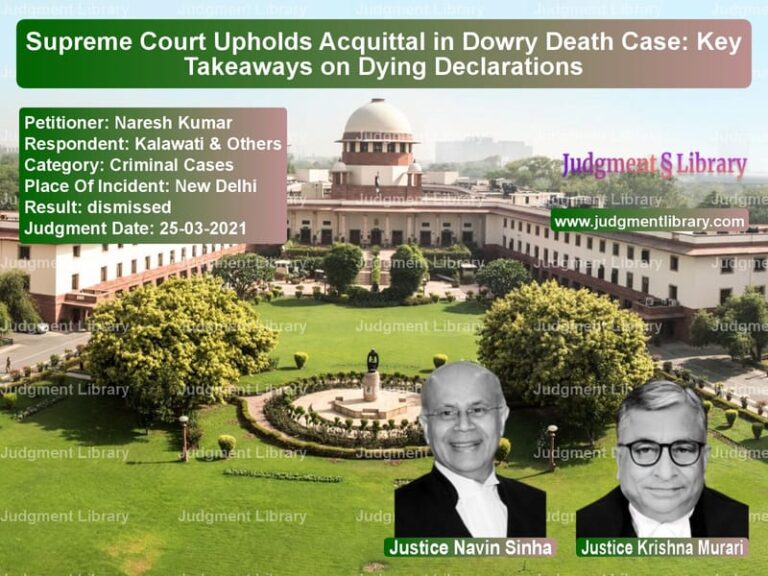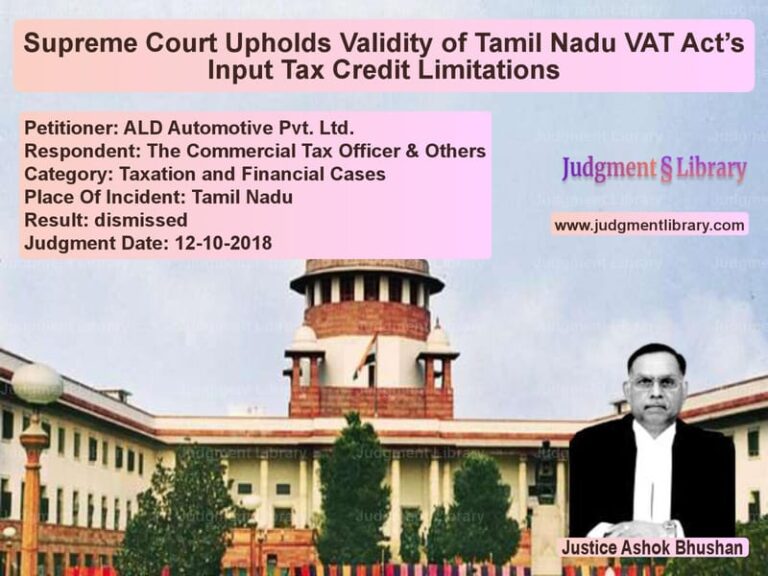Supreme Court Upholds Commercial Wisdom of Creditors in Insolvency Property Dispute
In a significant ruling that reinforces the authority of creditors in insolvency proceedings, the Supreme Court of India recently delivered a judgment that clarifies the powers of the Committee of Creditors during corporate insolvency resolution processes. The case involved a complex dispute over a prime property in New Delhi’s White House building, where multiple parties were locked in a legal battle about whether the property should be returned to its owners or retained by a company undergoing insolvency proceedings.
The dispute began when Nandini Impex Private Limited, which later became a corporate debtor under the Insolvency and Bankruptcy Code (IBC), borrowed significant funds from multiple lenders. To secure these loans totaling ₹6 crores, the company deposited title deeds for different portions of the ground floor of White House, a prominent building located at 1/18-20, Rani Jhansi Road in New Delhi. The financial transactions were structured through memorandums of understanding executed in February 2019, with Sincere Securities Private Limited and other entities providing the loans.
When Nandini Impex failed to repay these loans, the company executed conveyance deeds in February 2020, formally transferring the title of the property portions to the lenders. However, in a simultaneous arrangement, the company retained possession of the property through leave and license agreements that required monthly rental payments of ₹6 lakhs for each portion. This complex arrangement eventually led to disputes when the company defaulted on these rental payments as well, prompting the lenders to terminate the agreements and initiate eviction proceedings.
The situation became more complicated when UCO Bank filed an insolvency petition against Nandini Impex, which was admitted by the National Company Law Tribunal (NCLT) in September 2022. This initiated the Corporate Insolvency Resolution Process (CIRP) against the company. Notably, UCO Bank became the sole member of the Committee of Creditors (CoC), giving it complete decision-making authority in the insolvency process.
The lenders, now recognized as operational creditors in the insolvency process, filed their claims which were fully accepted. At this stage, UCO Bank directed the Resolution Professional to evaluate whether retaining the White House property made financial sense given the substantial rental costs involved. After careful assessment, the CoC determined that continuing to hold the property was not financially viable and decided to return possession to the owners.
This decision was challenged by Chandrakant Khemka, a suspended director of Nandini Impex, who argued that the property was essential for the company’s operations and that its return violated Section 14(1)(d) of the IBC, which prohibits recovery of property from a corporate debtor during the moratorium period. The NCLT initially sided with the creditors and ordered the property’s return, but the NCLAT later overturned this decision, leading to the Supreme Court appeal.
The Supreme Court carefully examined the sequence of events and the positions of all parties involved. The Court noted that except for Chandrakant Khemka, all other stakeholders – including UCO Bank (as the sole CoC member), the Resolution Professional, and the property owners – agreed that returning the property was in the best interest of the corporate debtor. The Court observed that “the Resolution Professional categorically stated that, given the extremely limited operations of the corporate debtor at present and the extremely high rent of the White House property, it was not feasible and was totally unnecessary for the corporate debtor to continue to hold on to the said property.”
The Court particularly emphasized the importance of respecting the commercial wisdom of the Committee of Creditors, drawing from its earlier landmark decision in K. Sashidhar v. Indian Overseas Bank. The judgment quoted extensively from this precedent: “The commercial wisdom of CoC has been given paramount status without any judicial intervention, for ensuring completion of the stated processes within the timelines prescribed by the I&B Code. There is an intrinsic assumption that financial creditors are fully informed about the viability of the corporate debtor and feasibility of the proposed resolution plan.”
The Court further elaborated that “the legislature, consciously, has not provided any ground to challenge the ‘commercial wisdom’ of the individual financial creditors or their collective decision before the adjudicating authority. That is made non-justiciable.” This principle became central to the Court’s reasoning in the current case.
Addressing the specific objection raised under Section 14(1)(d) of the IBC, the Court made an important distinction. The provision generally prohibits recovery of property from a corporate debtor during the moratorium period. However, the Court found that this was not a case of owners forcibly seeking to recover their property. Rather, it was the CoC and Resolution Professional who actively wanted to return the property due to its financial burden on the corporate debtor.
The Court noted that “this was not a simple case of the owner of the property seeking recovery of possession thereof from the corporate debtor, which would be barred by the express language of Section 14(1)(d) of the IBC. On the other hand, as already noted hereinbefore, it was the CoC and the Resolution Professional who were and still are desirous of returning the possession of the property in question to the appellants, keeping in mind the adverse financial implications of retaining the same.”
The judgment also highlighted the practical realities of the situation. The corporate debtor had only 8 to 9 staff members operating from the premises, and the revenue generated was insufficient to cover the substantial rental costs. The Court noted that Chandrakant Khemka, while opposing the return of the property, was “not willing to personally bear the expenditure for such retention” and seemed to be “bent upon stalling that process for some undisclosed and extraneous reasons.”
In its concluding remarks, the Supreme Court set aside the NCLAT’s order of remand and restored the original NCLT decision that had directed the return of the property to the owners. The Court emphasized that “the commercial wisdom of the CoC must, accordingly, be given primacy during the CIRP. When UCO Bank, constituting the CoC, decided that retention of the possession of the subject property was not in the interest of the CIRP, that decision must be given the respect that is lawfully due to it.”
This judgment reinforces the fundamental principle underlying the Insolvency and Bankruptcy Code – that financial creditors are best positioned to make commercial decisions about the assets of a corporate debtor during insolvency proceedings. By upholding the decision of the Committee of Creditors to return a costly property that was draining the corporate debtor’s resources, the Supreme Court has once again affirmed the autonomy and commercial wisdom of creditors in the insolvency resolution process.
The ruling serves as an important precedent for future cases where similar conflicts may arise between the statutory protection offered to corporate debtors under the moratorium provisions and the practical commercial decisions made by creditors seeking to maximize value for all stakeholders in the insolvency process.
Petitioner Name: Sincere Securities Private Limited & Ors..Respondent Name: Chandrakant Khemka & Ors..Judgment By: Justice Sanjay Kumar, Justice Satish Chandra Sharma.Place Of Incident: New Delhi.Judgment Date: 05-08-2025.Result: allowed.
Don’t miss out on the full details! Download the complete judgment in PDF format below and gain valuable insights instantly!
Download Judgment: sincere-securities-p-vs-chandrakant-khemka-&-supreme-court-of-india-judgment-dated-05-08-2025.pdf
Directly Download Judgment: Directly download this Judgment
See all petitions in Bankruptcy and Insolvency
See all petitions in Corporate Governance
See all petitions in Debt Recovery
See all petitions in Property Disputes
See all petitions in Contract Disputes
See all petitions in Judgment by Sanjay Kumar
See all petitions in Judgment by Satish Chandra Sharma
See all petitions in allowed
See all petitions in supreme court of India judgments August 2025
See all petitions in 2025 judgments
See all posts in Corporate and Commercial Cases Category
See all allowed petitions in Corporate and Commercial Cases Category
See all Dismissed petitions in Corporate and Commercial Cases Category
See all partially allowed petitions in Corporate and Commercial Cases Category

